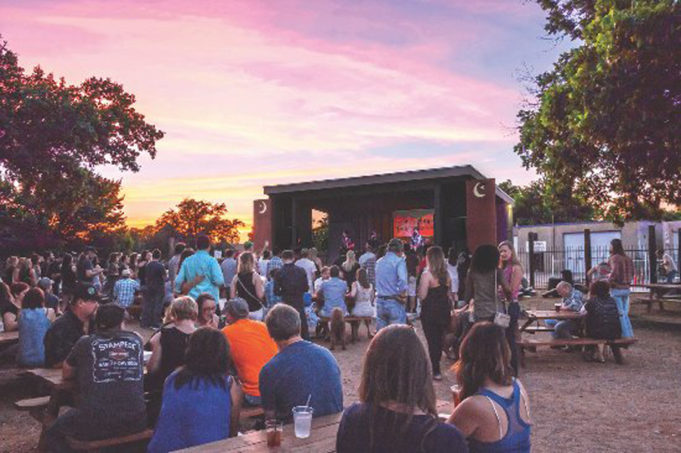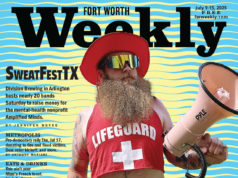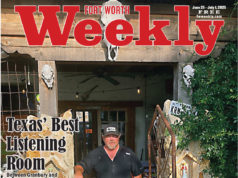We cannot wait until the day comes when we can write about something without having to acknowledge the context of the pandemic’s unprecedented effects upon the thing of which we are writing. But since the Fort Worth Weekly is not (yet) owned by Rupert Murdoch, we must report on the world as it exists and not how we wish it to be, so view our surroundings through horrid, spiky gray-ball glasses we must. The newest kid on the block, the omicron variant (seriously, a writer for the Syfy channel must be naming these things) has demonstrated a transmissibility of more than double that of Delta, according to some studies, so much so that this writer — a fully vaccinated, largely antisocial hermit — is writing this from bed recovering from his own bout with the nasty little bugger.
As this new strain rages throughout the population, businesses in every industry are certainly dealing with the effects, but what if your business model depends specifically on large groups of people gathering in a closed space? Because of this, music venues certainly face unique challenges in an ever-evolving COVID world. We spoke with three people responsible for trying to ensure their customers, employees, and their bottom lines are staying as safe and healthy as possible considering the difficulties the latest surge is presenting.
Brian Forella is owner and operator of Lola’s Trailer Park and the adjacent Lola’s Saloon. Ryan Higgs is the managing partner of Main at Southside (MASS), as well as a handful of other popular local watering holes, and Brooks Kendall is the head talent buyer for Affalon Productions, who takes care of booking for several local venues like The Post at River East and the Scott Theater.
What sort of effects are you seeing from this new variant on your business?
Forella: It’s been slow for a couple of weeks. We basically have just been doing what we were doing in the middle of the worst part of COVID last year. We have cut back hours inside the Saloon so most of the business stays outdoors. There are people definitely staying home, and omicron is for sure more contagious. Personally, I have friends and family that have now gotten it after never having it and are vaccinated.
Higgs: We have had a few cancellations and a couple of staffing issues. We are also starting to see a decrease in attendance. This decrease is coupled with it being January, which is always a slow month. I feel attendance could [begin to] suffer more.
Kendall: The biggest story for us has been staffing issues. We have had a lot of staff out sick over the last few weeks. I assume it has mostly been omicron, but it is hard to say because a lot of folks have had trouble getting tests, and when people get the at-home rapid tests, they don’t seem to be reliably accurate. We haven’t had any show cancellations yet. We are seeing a meaningful decrease in advance ticket sales, with most people seeming to want to wait until the last 24 hours before a show to commit to buying tickets. Traditionally, our concertgoers buy tickets well in advance, since the more popular shows tend to sell out.
Is there anything that would force you to consider having to shut down, or do you feel confident you can continue to operate your business in a way that makes customers and staff feel safe?
Higgs: I have no plans to shut down. We cannot survive another one. Mandatory masks are a consideration. Bands can also request masked shows. At some point, we have to accept this virus as a part of life. We must vaccinate, boost, and mask as necessary.
Kendall: We are currently on the verge of being down enough staff to need to shut down for a day or two. We haven’t reached that point yet, and it looks like we aren’t going to, but it is possible. As long as we have enough healthy staff willing to work, I don’t imagine we will shut down again unless it is mandated. If it were mandated, we would of course cooperate fully.
Have you considered mandating increased mitigation techniques? Requiring masks or proof of vax status?
Higgs: We cannot require proof of vaccination in Tarrant County, or that is my understanding.
Kendall: Our staff are all vaccinated. Much of the staff is back to wearing masks on their shift. Enforcing mask mandates on irrationally noncompliant people was very stressful and sometimes scary for our team. I don’t think anyone who is working for us at this time has any interest in being enforcers again without the support of a government mandate.
It must be incredibly discouraging that after only six months or so of finally getting back to some semblance of normalcy that it suddenly feels like we’re slipping all the way back to the beginning[.]? How do you feel?
Higgs: It is very frustrating. It feels as if the virus will continue and new variants will be created. Like I said, I believe this to be the new normal, and hopefully people will follow recommendations [from the Centers for Disease Control and Prevention] and do their part to keep themselves and others safe.
Kendall: The last couple of years have taught us to always be expecting these kinds of setbacks. Our focus now is on strategies to become successful in what has become a very different world for our industry.
Forella: Worn out.
How do you best navigate these frustrations and uncertainties going forward?
Higgs: I feel for all business owners. This is a very difficult time. I worry for friends who are trying to make their living on tour. The venues that they are headed to could be temporarily shut down [with just] a day’s notice. The bands themselves and their crews could contract the virus [and have to] cancel shows and quarantine at any point.
Kendall: The challenges we need to overcome are related mainly to supply chain and staffing shortages, but concert touring, ticket selling, and audience expectations are evolving in ways that are likely to be permanent. It is obvious at this point that this can happen again. Extreme weather events like last winter’s freeze are probably challenges we will have to overcome in the coming years as well. All that said, it’s time to stop waiting for things to go back to “normal” and instead start adjusting our business to be nimble and resilient in an increasingly unpredictable world.












